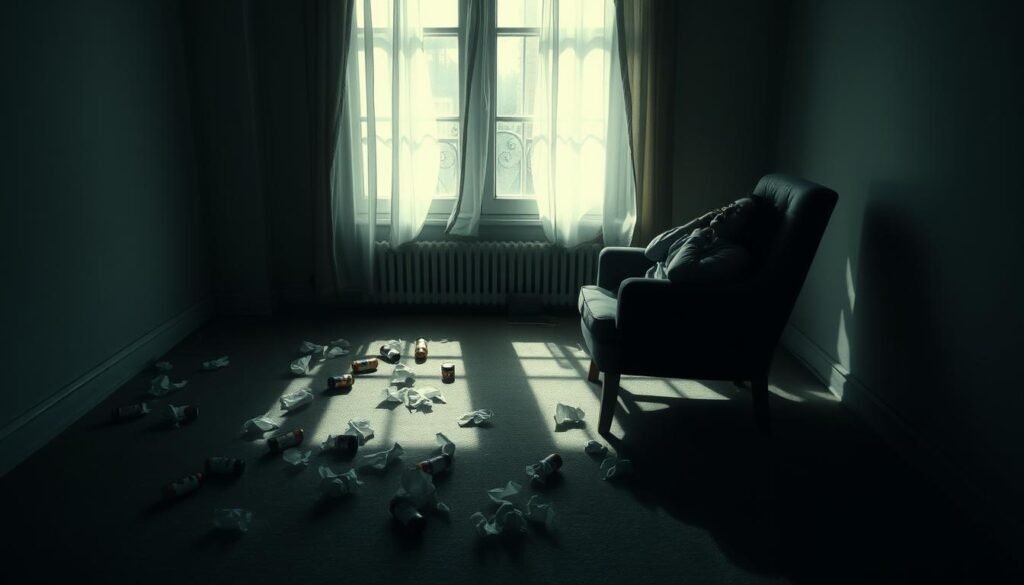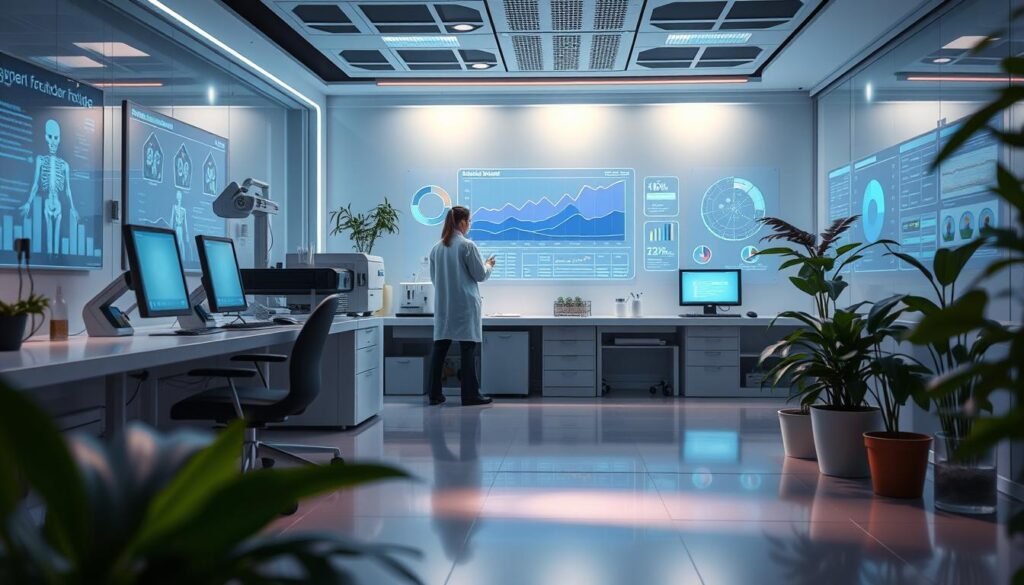Did you know that almost all cancer patients feel a type of tiredness that’s much worse than usual? The American Cancer Society points out that cancer-related fatigue is a big problem for those in treatment. This kind of fatigue doesn’t go away with rest and can last for more than a year after treatment for some. It’s important to know the difference between cancer fatigue and normal fatigue. This helps people understand and deal with their condition better.
Cancer treatments are getting better. But we also need to pay more attention to fatigue, a symptom that has a big impact. Many survivors have trouble sleeping and feel a lot of stress because of their diagnosis. It’s key to understand what causes cancer-related fatigue. This knowledge can help patients and those who care for them manage the symptom better.
Key Takeaways
- Nearly all cancer patients experience cancer-related fatigue beyond normal tiredness.
- Fatigue can persist for up to 18 months after treatment ends for some survivors.
- Cancer fatigue vs normal fatigue involves deeper physical and cognitive impacts.
- Regular exercise of 30 minutes, five days a week, may mitigate fatigue symptoms.
- Many cancer survivors struggle with sleep disorders due to fatigue.
- Emotional stress and treatment contribute significantly to cancer-related fatigue.
Understanding Fatigue: A Common Experience
Fatigue is common and can come from mental or physical work or health problems. Learning about definition of fatigue helps us manage our day-to-day and health issues better. Fatigue is more than just being tired from physical work. It can be complicated, especially when talking about long-lasting fatigue.
Definition of Fatigue
The definition of fatigue is feeling so tired you can’t do your daily tasks. It looks different for everyone and the severity varies. For some, like those with leukemia, no amount of sleep fixes their fatigue. This shows it’s a serious problem, not just regular tiredness.
Types of Fatigue
Knowing the types of fatigue helps us deal with it better. Here are some main kinds:
- Acute Fatigue: A short-lived tiredness usually tied to activity or stress.
- Chronic Fatigue: Lasts more than six months and might need a doctor’s help.
- Cancer-Related Fatigue (CRF): A severe, lasting tiredness not linked to activity levels.
- Emotional Fatigue: Comes from emotional stress, often in those sick.
Around 56% of leukemia patients feel very tired before getting diagnosed. This shows how vital it is to understand fatigue’s role in health. Especially when rest doesn’t make it better.
What is Cancer-Related Fatigue?
Cancer-related fatigue (CRF) is a tough condition for people with cancer. It’s more than just being tired. It deeply affects one’s body, feelings, and social life. Knowing about this fatigue helps us see its true impact.
Overview of Cancer-Related Fatigue
About 80% of patients getting chemo or radiation feel very tired. This tiredness can last weeks, months, or more after ending treatment. It’s worse than usual tiredness and doesn’t go away with rest.
Differences from Normal Fatigue
Cancer-related fatigue is different from the fatigue we all know in several ways:
- Duration: It can last for a long time even after treatment, unlike normal tiredness that sleep can fix.
- Intensity: Most people find it very intense. It affects how they feel and their daily life.
- Types: It can be physical, emotional, or even affect thinking. This shows it’s a complex issue.
- Impact: It can change how well someone can work, their social life, and their overall happiness.
Understanding these key differences helps those taking care of cancer patients. It ensures they get the right help and support.
Characteristics of Cancer Fatigue vs. Normal Fatigue
Cancer fatigue is much more intense than normal fatigue. Knowing the differences helps us understand the struggles of fighting cancer. It highlights the physical symptoms and mental effects of fatigue. It also shows how long cancer fatigue lasts, setting it apart from regular tiredness.
Physical Symptoms
Cancer fatigue shows in many ways. Patients often feel weak, which makes daily tasks hard. They might experience:
- Severe tiredness that rest doesn’t fix
- Muscle pain and sore joints
- Problems with sleep, like insomnia
After treatments like chemo or radiation, fatigue can begin. It often gets worse towards the end of therapy. Many people see a big drop in energy. This makes keeping up with daily life tough.
Cognitive Effects
The mental effects of fatigue can be tough. Cancer patients might face:
- Trouble thinking or concentrating
- Memory problems
- Feeling anxious or depressed because of ongoing fatigue
These issues make finishing tasks or talking with others hard. They add to the burden of cancer fatigue.
Duration and Persistence
Cancer-related fatigue lasts much longer than normal fatigue. Regular tiredness goes away with rest. But cancer fatigue can stick around for weeks, months, or years after treatment. About 65% of people with cancer suffer from it. It greatly affects their life. Getting the right support and tailored strategies is key to deal with this tough condition.
What Causes Cancer-Related Fatigue?
Cancer-related fatigue is hard to handle and comes from several sources. These include the illness itself, its treatment, and mental stress. By learning about causes of cancer fatigue, people with cancer and their supporters can find better ways to deal with it. We’ll look into how cancer affects the body, the effects of treatment, and the role of emotional struggles.
Impact of Cancer on the Body
Cancer makes people feel more tired and weak. This is because the body uses a lot of energy to fight the disease. People may eat less and lose weight, which also makes them feel more tired. Those with advanced cancer are often more tired than those in the early stages.
Also, cancer can make you feel worn out, breathless, and dizzy. This is often due to anemia, which happens when there aren’t enough red blood cells.
Role of Cancer Treatments
Cancer treatments like chemotherapy often make people very tired. This is because these treatments can reduce red blood cells. About 50-90% of people getting chemotherapy feel this kind of tiredness. Radiotherapy can also make you feel tired, especially as treatment goes on.
This tiredness can last for months after treatment is over. When people have more than one kind of treatment, they feel even more tired. For example, bone marrow transplant recipients may feel tired for a year or more.
Emotional and Psychological Factors
Feeling down or anxious can also make fatigue worse for cancer patients. After diagnosis, 20-30% of patients may feel depressed, which adds to their tiredness. Worry and stress can make it hard to sleep, increasing tiredness.
The discomfort from treatments, along with stress, can start a tough cycle of fatigue. So, it’s clear that both physical and mental challenges contribute to cancer-related fatigue.
| Factor | Impact on Fatigue |
|---|---|
| Cancer Stage | Increased fatigue in advanced stages |
| Chemotherapy | 50-90% report fatigue linked to anemia |
| Radiotherapy | Fatigue can persist weeks or months post-treatment |
| Emotional Distress | 20-30% report depression contributing to fatigue |
| Sleeplessness | Up to 40% have sleep difficulties exacerbating fatigue |
Recognizing Symptoms of Cancer Fatigue
Spotting cancer fatigue early is key for quick action. Both patients and caregivers must watch for signs of this tough condition. Knowing when to get medical advice can improve the patient’s health.
Signs to Look For
Cancer fatigue is more than just feeling tired. Patients might feel:
- Persistent exhaustion: This happens even after good rest.
- Cognitive decline: They may face memory issues, get confused, and have trouble focusing.
- Unexplained weight loss: Losing a lot of weight suddenly could be a warning sign.
- Nighttime fevers: Fevers at night, especially with sweats, may hint at cancer.
- Persistent pain: Ongoing pain could be from tumor pressure or cancer growing.
- Skin changes: Strange moles with odd shapes or colors could mean cancer.
When to Seek Medical Advice
If you notice signs of cancer fatigue, it’s important to see a doctor. Here are some times when you should seek help:
- Fatigue doesn’t improve with rest.
- It’s hard to handle daily tasks.
- You’re feeling confused on top of being very tired.
- Extreme tiredness affects moving around or comes with other worrying signs.
Noticing these symptoms early, especially for cancer-related fatigue, can help people get the support they need. It can make a big difference in their quality of life.
Coping with Fatigue: Strategies for Management
Managing cancer-related fatigue involves several approaches. This includes lifestyle changes, physical activity, and support systems. Many techniques focus on lessening symptoms and boosting life quality for cancer patients. Practical coping strategies can reduce exhaustion and frustration greatly.
Practical Approaches
Effective strategies include:
- Short Naps: Taking short naps during the day can boost energy without affecting nighttime sleep.
- Dietary Adjustments: Eating a balanced diet helps the body fight fatigue.
- Support Groups: Being part of a support group provides emotional help and a space to share with others in similar situations.
- Cognitive Behavioral Therapy: CBT can greatly cut down fatigue and better coping skills.
- Relaxation Techniques: Using yoga, tai chi, and mindfulness can ease fatigue symptoms.
Impact of Physical Activity
Regular, gentle exercise has many benefits. Walking, swimming, or biking boosts strength and energy. Studies reveal that daily exercise can lift mood and energy by 20-30%. Starting a physical activity routine before cancer treatment is helpful.
About half of cancer patients in treatment might find exercise tailored to them useful. Without good fatigue management, patients often feel very overwhelmed. Thus, adding exercise is key to managing fatigue well.

Cancer Fatigue vs. Normal Fatigue: Key Differences
It’s crucial to know how fatigue in cancer differs from normal tiredness. Cancer fatigue sticks around, unlike usual fatigue. It doesn’t go away with just rest or sleep after daily activities.
Persistent Exhaustion in Cancer Patients
Cancer fatigue sticks around a lot. For example, about 33% of women treated for breast cancer feel tired for up to ten years after. This tiredness can be worse than nausea, pain, or feeling down, greatly hurting how the patient lives.
Up to 80% of those with cancer experience fatigue during their treatment. This shows how common and challenging fatigue is for cancer patients.
Effect of Rest and Recovery
Sleep doesn’t always fix cancer-related fatigue, unlike normal tiredness. About half of the patients recovering from surgery feel very tired. This long-lasting tiredness means doctors and patients should keep a close eye on it as it varies a lot between people.
| Type of Fatigue | Characteristics | Impact on Quality of Life | Persistence |
|---|---|---|---|
| Normal Fatigue | Usually short-lived, improves with rest. | Potentially low impact on overall well-being. | Temporary; alleviates with lifestyle changes. |
| Cancer-Related Fatigue | Chronic exhaustion, resistant to rest. | Significantly negative impact, often more distressing than pain or nausea. | Can last for months to years post-treatment. |
Learn more about cancer fatigue from this informative resource. It provides insight into the unique nature of cancer-related fatigue.
The Emotional Toll of Cancer Fatigue
Cancer fatigue is more than just feeling tired. It also hits hard emotionally. Patients often feel anxious, scared, and alone. Up to 100% of them deal with this fatigue, feeling emotionally overwhelmed.
This kind of fatigue isn’t like normal tiredness. It can stick around long after treatment is done. It can really affect someone’s mental health and happiness.
Understanding the Emotional Impact
Emotional struggles can make fatigue even worse. This creates a hard cycle to break. Many survivors say they feel tired for months or years later.
Poor sleep and depression often tag along with fatigue. It’s important to see the emotional struggle it brings. Both patients and their supporters must work together to overcome these issues.
Support Systems for Emotional Well-Being
Having a good support system is key for dealing with these emotional effects. Therapy and support groups are so helpful. They give people a place to share and heal, making them feel connected and less isolated.
Talking with doctors and joining forums can also help patients. They learn to manage both emotional and physical sides of fatigue. For tips on handling cancer-related fatigue, check this resource. It has info on treatments and finding support.

Professional Support and Resources
Cancer-related fatigue (CRF) greatly affects many patients and survivors. Getting professional support for cancer fatigue is key in helping manage this tough condition. A team approach is crucial to meet the varied needs of those with CRF.
Importance of Multidisciplinary Care
A group of healthcare pros provides full support, using knowledge from different areas. Oncologists, nutritionists, psychologists, and physiotherapists work together on care plans. This approach ensures all parts of fatigue, from physical to emotional health, are covered. Studies show managing cancer fatigue well requires more than symptom treatment; long-term plans help a lot. For further information, check out this resource on the role of multidisciplinary care.
Available Support Services
There are many support services for patients with cancer-related fatigue. These services might include:
- Exercise classes to boost energy and health.
- Nutrition advice for a fatigue-fighting diet.
- Counseling for emotional challenges.
- Workshops on better sleep and relaxation.
Maggie’s offers many programs to help manage fatigue. Their efforts empower patients in their recovery journey. With professional support, individuals find ways to regain strength and improve life quality.
Research and Studies on Cancer Fatigue
Studies into cancer-related fatigue dig deep into its major effects on patients. These studies highlight the role of biological, psychological, and social aspects. They provide insights into the causes, prevalence, and management methods needed for better care.
Insights from Recent Studies
Up to 90% of patients receiving chemotherapy experience moderate to severe fatigue. Studies over time reveal that 30-40% of survivors feel fatigued years after treatment. This long-lasting fatigue lowers quality of life and makes it hard to get back to daily life or work.
Behavioral and psychosocial treatments show promise but take a lot of time. Currently, very few drugs effectively tackle cancer fatigue, as shown in tests.
Genetic studies show big differences in fatigue levels among cancer patients, ranging from 6% to 50%. Studies with twins show genetics play a big role in this fatigue.
Ongoing Research Focus on Fatigue Management
New research is examining cancer fatigue’s complex nature, including genetic aspects linked to inflammation. These studies aim to find new markers that could lead to focused research. The 3P model combines biological and psychosocial factors to understand fatigue better.
Factors like inflammation and metabolic issues are key in developing cancer-related fatigue. But, given the limited success of drugs, treatments focusing on behavior are essential. Experts now believe teaching patients to manage their health can reduce fatigue’s impact.
Addressing factors like sleep problems, lack of activity, and poor diet is vital. Continuing research will help create thorough plans for overcoming cancer-related fatigue.

Real Patient Experiences with Cancer-Related Fatigue
Understanding cancer-related fatigue’s deep impact is moving. Survivors’ stories shine a light on this condition’s real-life effects. They show both the hard battles and victories in dealing with fatigue during and after cancer treatment.
These personal accounts offer comfort and understanding. They help others facing the same struggles.
Personal Stories and Testimonials
Many share their experiences with fatigue. It affects their everyday life. One survivor talked about the extreme tiredness she felt. It was there before her diagnosis and during treatment.
This wasn’t just being tired. It was a deep exhaustion that stopped her from doing things she loved. Many patients feel this kind of severe fatigue. It often stays with them, even after treatment ends.
Lessons Learned from Survivors
Survivors share vital lessons. They stress the importance of asking for help. This could be from doctors or support groups. Adding light exercise to their day can help reduce fatigue symptoms.
It’s also crucial to care for oneself and set achievable goals. These stories of resilience give hope. They show that, although everyone’s experience is different, fighting fatigue can lead to strength and a sense of community.
Conclusion
Understanding cancer-related fatigue is key to realizing its deep impact on people’s lives. We have shown how cancer fatigue differs from regular tiredness. Cancer fatigue is more intense and lasts longer, affecting many patients in treatment.
Studies show fatigue can affect up to 90% of patients in chemotherapy. This highlights the importance of managing cancer fatigue properly.
Knowing the signs of cancer fatigue is the first step toward getting the right help. It’s important for patients to talk to their doctors about their fatigue. Yet, over 40% are hesitant to mention it. This can prevent effective management.
Support groups and resources are crucial in dealing with fatigue. They help improve patients’ physical health and their overall life quality.
In summary, this article offers insights to better manage cancer fatigue. Understanding symptoms and seeking support can significantly improve patients’ daily lives. They can navigate cancer treatment’s challenges more successfully.